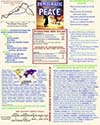Why Poor Nations? It’s Power, Of Course
By Colleague
In “Laws (and wealth) of nations: A controversial theory blames countries’ lagging economies on Napoleon,” Nicholas Thompson (link here) asks, “Why do some countries prosper while others falter? It’s one of the world’s trillion-dollar questions.” To answer this, he describes the research of four economist on the connection between — in very general terms — “prosperous economy” and “type of legal system.” Their core finding: common law based systems perform better than (French-based) civil law systems. The reason: common law systems give more power to the judicial branch, which does a better job as cross-checking other institutions of government power.
In other words, even though the article doesn’t make the connection, the really important variable is Power. The more it is checked and held accountable, the better the economy. No surprise to democratic peace theorists! Indeed, Power is something that matters across the spectrum of a country: concentrations of Power matter in politics, economics, society, the legal system, education, religion, sports — everything! If Power is minimal, then People prosper and thrive. If Power is concentrated, then People do the bidding of others — not themselves — and they do not prosper. And if Power is concentrated everywhere, we find totalitarianism, which is most simply defined as a political system which tries to control everything, including thought. And in such systems, Power Kills.
Why is something so simple so hard?
=============================
From Rummel:
Link of Note
2005 Index of Economic Freedom
Note that his index in de facto a measure of centralized power. Note then that the most economically free countries are generally those with decentralized power (the U.S. tied at 12th with Switzerland), the most political free, and those with the most represent economies are generally the poorest countries. Power not only kills, it impoverishes.



 Posted by rudyrummel
Posted by rudyrummel 






